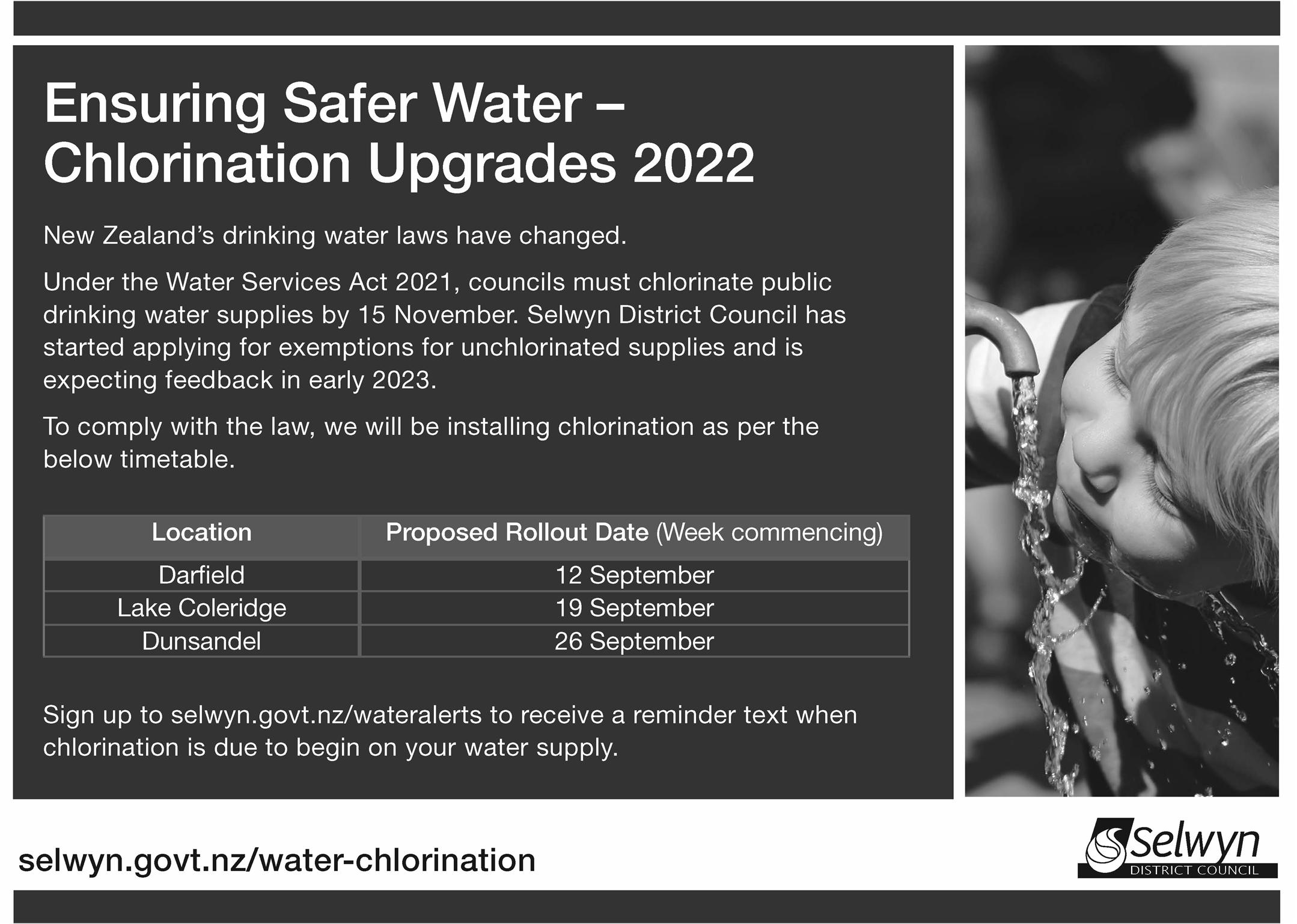
3 minute read
Chlorination Upgrades
New Zealand’s drinking water laws have changed!
Under the Water Services Act 2021, passed in November 2021, all councils must provide residual disinfection (chlorine) for public drinking water supplies by November 15th, 2022, unless they have an exemption from the drinking water authority Taumata Arowai.
Advertisement
Selwyn District Council has started applying for exemptions for public water supplies that are not already chlorinated.
The Council has made a major investment in recent years to upgrade all its water supplies to have a multi-barrier approach using filtration, UV treatment and other barriers at all water treatment plants. The required chlorination provides protection for water within the reticulation system (pipes) between the treatment plant and its users. Chlorination has been used safely and effectively all over the world for more than 100 years as a preventative treatment to avoid contamination of water supplies. It keeps millions of people around the world safe from waterborne disease, including the majority of New Zealanders. per million (ppm) in the water when it reaches each property on the supply. Chlorine levels are monitored continuously at the treatment plants to ensure the levels are safe.
In Selwyn, there are eighteen unchlorinated schemes that require upgrades and nine water supply schemes are already permanently chlorinated providing effective treatment to keep the water safe for those communities: • Upper Selwyn Huts • Dalethorpe • Hororata • Acheron • Sheffield/Waddington • Springfield • Castle Hill • Hartleys Road (Malvern Hills) • Arthurs Pass.
Selwyn District Council was the first Council in the country to apply for an exemption from chlorination. The Council is continuing to work through the process of applying for exemptions using a risk-based approach and are expecting feedback from Taumata Arowai on these applications in early 2023. The new rules require a minimum dosage of 0.2 parts To receive a reminder text or email when chlorination is due to begin on your water supply you can sign up to water alerts at:
selwyn.govt.nz/wateralerts
Or for further information visit:
selwyn.govt.nz/water-chlorination
I can taste/smell the chlorine, why? In the early stages of chlorination you might notice a slight change in taste as the new treated water moves through the scheme and mixes with unchlorinated water in the Council’s reservoirs. However, most users report that this settles after the first few days.
At the minimum dose most people should not be able to smell or taste chlorine. However, the smell and taste of chlorine increases when the chlorine is consuming any organics, or when the dose is increased. So being able to smell or taste the chlorine could mean that it is doing its job of treating anything that could make your drinking water unsafe. Alternatively it could mean that the dose has been increased due to a specific situation where we’ve needed to add more to keep the water safe.
What about my pets? If you have fish in outside ponds you will need to either turn down in-coming water to an absolute trickle (this dilutes the chlorine level to a safe amount for your fish) or fill up drums of water and let them sit for at least 24 hours before using (the UV of the sun evaporates chlorine).
For fish tanks or bowls inside, fill up a container of water and let it sit for at least 24 hours and then only replace a third of the water at a time. Alternatively, you can buy recommended water conditioners or de-chlorinating kits (sodium thiosulfate) at pet supplies stores.
What if I have a skin condition or sensitivity to chlorine? Chlorine can be an irritant for existing skin conditions such as asthma or eczema. If you feel your skin getting dry or itchy, use moisturiser after having a shower or bath. If you notice increased skin irritation, asthma symptoms or other symptoms, seek medical advice from your GP. To minimise exposure to chlorine, try bathing at times of low water demand - in the middle of the day on weekdays, early in the morning (before 7:30am), or late in the evening (after 9:30pm).


